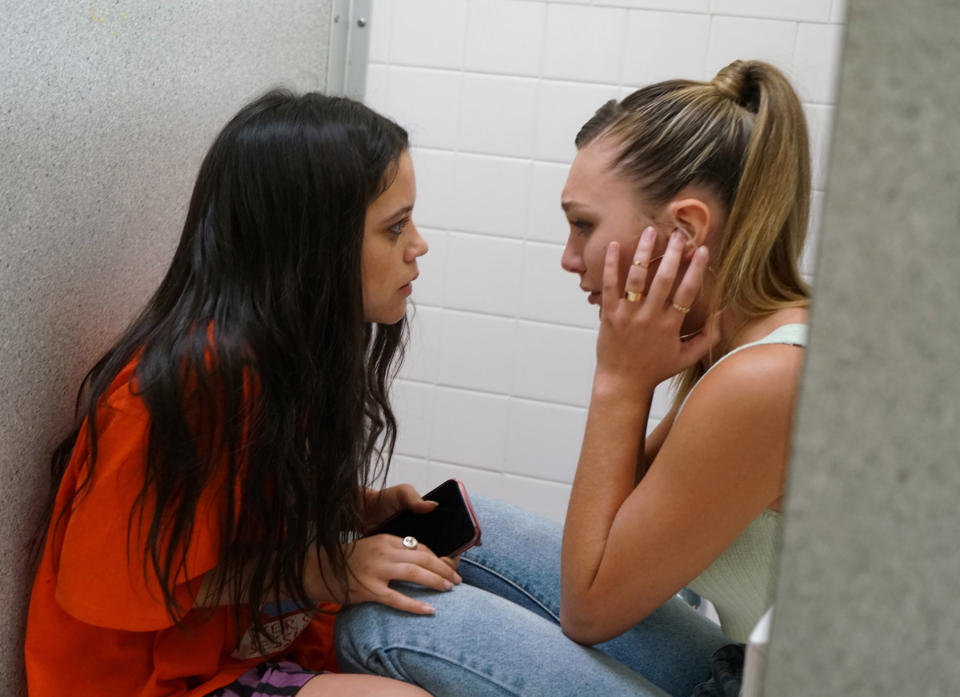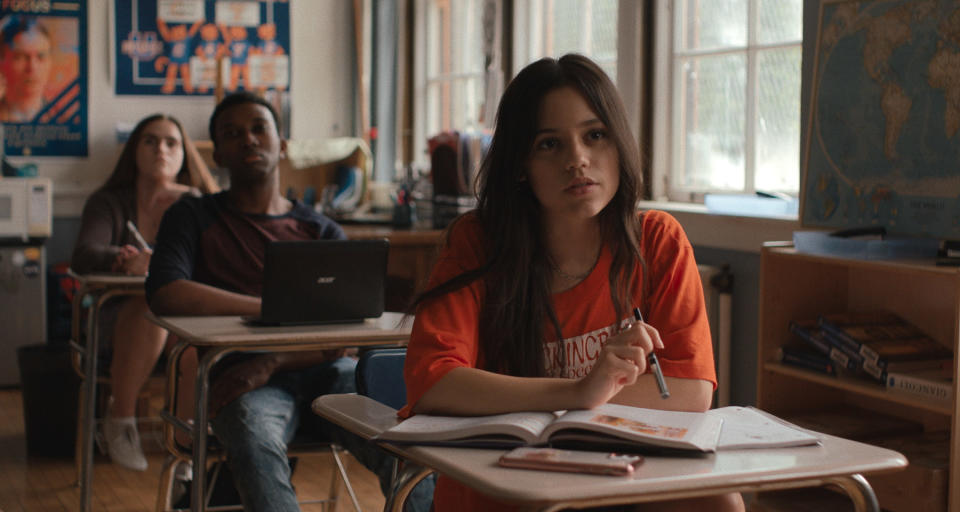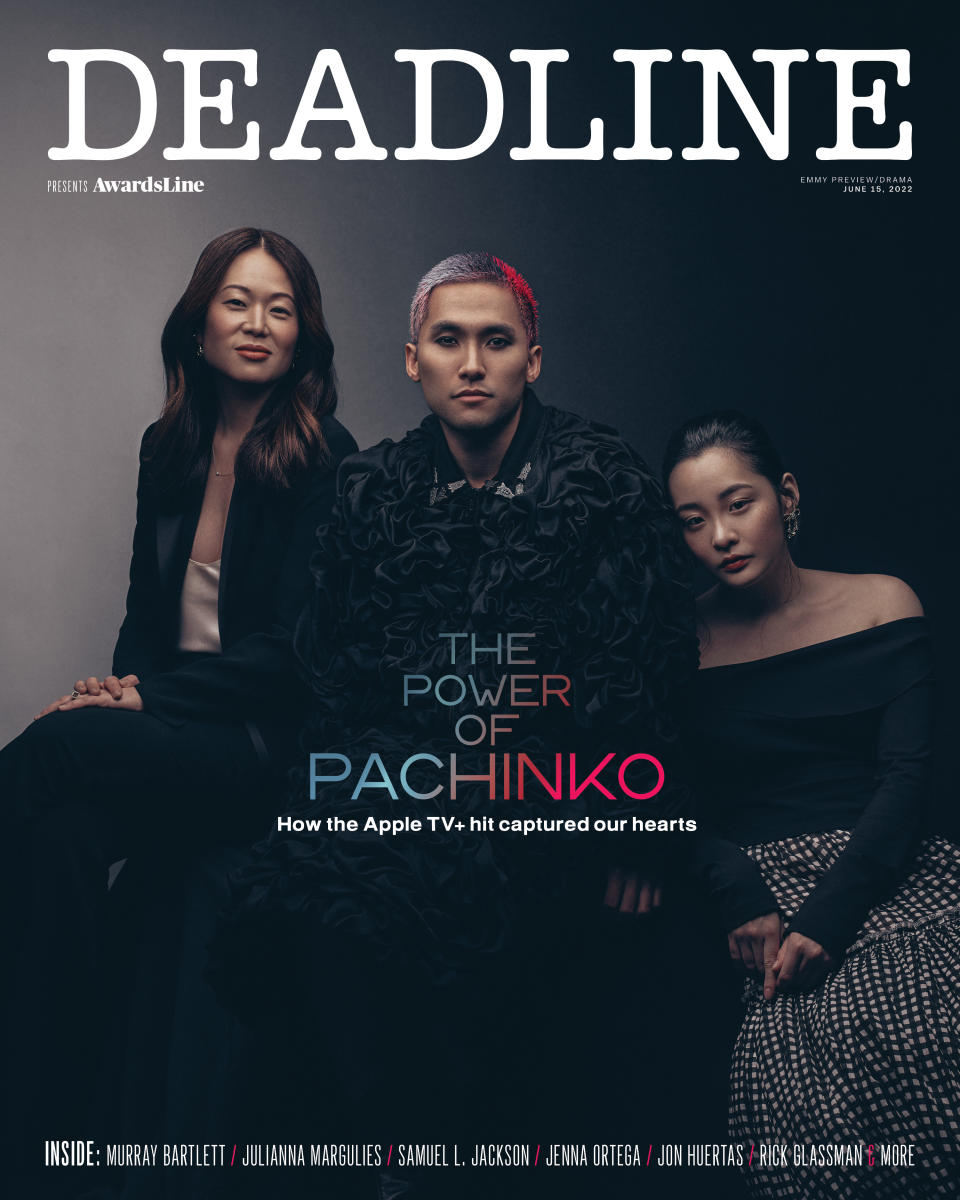‘The Fallout’ Star Jenna Ortega On The Horror Of School Shootings: “It Could Happen Anywhere, At Any Time”
- Oops!Something went wrong.Please try again later.

The HBO Max drama The Fallout depicts a scenario that has become all too real: a shooting at a school that leaves young people dead or injured. The unthinkable tragedy in Uvalde, Texas is the latest horrific example of a problem that has become all-too endemic in the United States. Actress Jenna Ortega stars in the film written and directed by Megan Park, portraying a teenage survivor of an attack struggling with the trauma that has resulted from what she has endured. Ortega explores an aspect sometimes overlooked in the wake of such a devastating event—the lasting emotional impact on the children who survive.
DEADLINE: What were your thoughts as you embarked on this film, involving such wrenching subject matter?
More from Deadline
'Wednesday' Teaser: First Look At Jenna Ortega As Wednesday Addams In Tim Burton's Netflix Series
'Scream' Sequel Seeing Return Of Melissa Barrera, Jasmin Savoy Brown, Mason Gooding & Jenna Ortega
JENNA ORTEGA: A project like this, it’s so relevant and it’s so unfortunately real that I think it was a bit nerve wracking because obviously I only want to be respectful to anybody who’s ever experienced anything like this before. It’s a very sensitive topic. But after meeting with Megan, the writer-director who’s so wonderful and put so much time and effort into this project, knowing that she was only coming from a place of respect and well-meaning and had educated herself on the topic, I felt safe to proceed.
DEADLINE: You started acting quite young. Did you go to regular schools? I’m wondering if you had to do active shooter drills?
ORTEGA: I went up until my freshman year of high school. I was in public school. We always had active shooter drills. When I was in eighth grade, we had an active shooter drill that was supposed to take place after lunch. And as soon as lunch began, the alarm system went off and the teachers ushered all the students into our main auditorium. And we were asking, “Wasn’t this supposed to start later?” And we’re thinking, Oh, maybe they’re trying to do an element of surprise or something like that. And even when we were sitting in the auditorium, it just seemed a bit off and we kept asking the teachers, “Is this real? Is this real?” We didn’t realize it was actually a real situation. And apparently a student had brought a gun on campus and was showing people. The police came, they escorted the student out and it was a whole big deal. It’s intense when something suddenly turns real like that. Nobody ever really understands until it happens to them. So, I think I had already had that moment of, it could happen anywhere, at any time. My younger siblings, there have been times when they have been told not to go to school certain days because there was a bomb threat or something. It’s awful.

Warner Bros./HBO Max
DEADLINE: I understand that as part of your preparation for the role you researched kids who had gone through school shootings.
ORTEGA: Unfortunately, because it is such a common occurrence, there’s so much out there. I watched videos, interviews. I also looked at images and at absolutely anything I could get my hands on to focus more on the actual events, and then all of that thinking and processing after it just kind of came naturally.
Then, also, when the March For Our Lives movement first initiated, I tried to be as active as I could on social media or going to marches and events and summits. And I actually had the privilege of hearing Parkland [Florida] students such as X González speak, and I got to speak with them afterwards. It was incredibly moving, and I think it would have been really beneficial for absolutely anyone to hear.
DEADLINE: You go through such a range of emotions in the film. In one scene with Maddie Ziegler, who plays a classmate, you’re in a girls’ bathroom when the shooting breaks out, which happens off camera. Was there a scene you found most challenging or difficult to do?
ORTEGA: I feel like it was that bathroom scene. It’s kind of strange, too, because we shot the entire film and that was actually the last scene that we shot. Obviously, approaching the subject with kind of like hesitancy because you never want to tell a story that isn’t yours, you have to fully commit in a situation like that… The whole cast and crew were visibly affected. Everyone stopped talking. Everybody kept their head down and everybody did what we had to do. We approached it as delicately as we could. And we tried our best to not do anything that was too triggering or too much for audiences, but then also give them the jarring realization of naturalness. That one was really scary. You just really, really want to do it right. Yeah. You just want to do it right. And that was nerve wracking.
DEADLINE: Maddie Ziegler’s character in The Fallout is a social media influencer. In real life, you have 7.7 million followers on Instagram. Do you see yourself as a social media influencer?
ORTEGA: I got [my Instagram account] for my job when I was younger and I was on Disney Channel for a while and they tell you, “Post every day, do this.” They give you a set of instructions on how to build your account so that you could get more people to watch your show. So that’s what I did. They know what they’re doing because it worked, but now I’m left over with [it]. I’m so scared of social media and if I could delete my pages I would, and I think I will one day. But one of the benefits is literally anyone all over the world is accessible. So, it opens up for really important conversations when necessary. But it’s becoming more and more of a toxic environment. I feel like people aren’t welcoming toward people asking questions anymore without some sort of criticism or harassment that makes it scary. It doesn’t need to be that scary. I feel the internet has too much power at this point.

Warner Bros./HBO Max
DEADLINE: A recent post on your Instagram feed showed you with a book by John Updike. What’s on your bookshelf? Are you a reader?
ORTEGA: I’m a massive reader. I actually really love to collect antiquarian literature and I love that my job allows me to travel so much because now my books are from all over the world. Ralph Waldo Emerson was the first author or transcendentalist that I connected with and resonated with. And I found that when I was in New Zealand. I have multiple books of his own personal essays. Self-Reliance was a big one for me. I just got Virginia Woolf—The Moment and Other Essays. I’ve never read her before, so I’m very excited because I know that she’s a big deal.
I read a lot of satirical stuff, like A Tale of a Tub by Jonathan Swift and things like that. I’m trying to get into Charles Bukowski because I have a lot of friends who love Bukowski. Love Is a Dog From Hell is a book that I’m trying to get my hands on right now.
DEADLINE: Until recently, very few LatinX people got the opportunity to fully showcase their talents in Hollywood. How significant is it to you to be a Latina in this industry and becoming so successful?
ORTEGA: Being Latina has always been really, really lovely for me. It’s something that I’m very proud of. I grew up in a community [Coachella Valley, California] surrounded by all kinds of Hispanics, which was really wonderful because I never grew up with any sort of shame or any sort of fear of my culture.
I feel like regardless of whether or not people are looking to get into some sort of creative field with their work, representation is so, so important in building one’s self-esteem or self-respect. Growing up, these kids are watching the pretty girl or guy never looks like them. It’s never the lead or never the main character or always the joke, especially because Hispanics tend to be shown in such a negative light. It’s either the maid or the drug dealer’s daughter… I always got really excited when I got those jobs that were open ethnicity or maybe initially meant for a Caucasian actor… I do want to open the doors for as many Latin people as possible, just because we’re a beautiful community and we should be celebrated. The Latin community only take up three percent of all representation shown across television and film media. The TV world, the film world, should reflect what the real world looks like. It’s not all one color. I think Latins are making their way up there, but we’ve still got a way to go.

DEADLINE: At age 19, is there anyone in the business you look to as a good role model for your career?
ORTEGA: Recently, my greatest obsession is Riz Ahmed. Not only a powerhouse of an actor, but then also just everything that he stands for. He’s so smart in the roles that he takes. He’s incredibly well-spoken and also is really, really amazing in the activism field, which, if I could have a career more similar to his or even just be able to speak up and gain the same type of knowledge he seems to have about the things that matter to him, I would love to do the same. I think he’s a good role model for me.
Best of Deadline
2022-23 Awards Season Calendar - Dates For The Oscars, Emmys, Tonys, Guilds, Festivals & More
NFL 2022 Schedule: Primetime TV Games, Thanksgiving Menu, Christmas Tripleheader & More
Sign up for Deadline's Newsletter. For the latest news, follow us on Facebook, Twitter, and Instagram.

